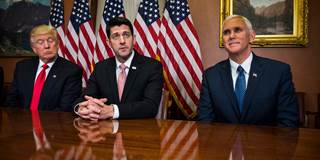It is a post-financial-crisis myth that austerity-minded conservative governments always favor fiscal prudence while redistribution-oriented progressives view large deficits as the world’s biggest free lunch. This simplistic perspective badly misses the true underlying political economy of deficits.
CAMBRIDGE – It is a post-financial-crisis myth that austerity-minded conservative governments always favor fiscal prudence, while redistribution-oriented progressives view large deficits as the world’s biggest free lunch. This simplistic perspective, while perhaps containing a grain of truth, badly misses the true underlying political economy of deficits.
The fact is that whenever one party has firm control of government, it has a powerful incentive to borrow to finance its priorities, knowing that it won’t necessarily be the one to foot the bill. So expect US President-elect Donald Trump’s administration, conservative or not, to make aggressive use of budget deficits to fund its priorities for taxes and spending.
The most accurate framework for thinking about government budget deficits in democracies was proposed in the late 1980s by the Italian scholars Alberto Alesina and Guido Tabellini, more or less simultaneously with two Swedes, Torsten Persson and Lars Svensson. While their approaches differ slightly in detail, the basic idea is the same: You give money to your friends while you can. If there is less money to go around later, when the opposition party gets its turn in power, well, that’s just too bad.

CAMBRIDGE – It is a post-financial-crisis myth that austerity-minded conservative governments always favor fiscal prudence, while redistribution-oriented progressives view large deficits as the world’s biggest free lunch. This simplistic perspective, while perhaps containing a grain of truth, badly misses the true underlying political economy of deficits.
The fact is that whenever one party has firm control of government, it has a powerful incentive to borrow to finance its priorities, knowing that it won’t necessarily be the one to foot the bill. So expect US President-elect Donald Trump’s administration, conservative or not, to make aggressive use of budget deficits to fund its priorities for taxes and spending.
The most accurate framework for thinking about government budget deficits in democracies was proposed in the late 1980s by the Italian scholars Alberto Alesina and Guido Tabellini, more or less simultaneously with two Swedes, Torsten Persson and Lars Svensson. While their approaches differ slightly in detail, the basic idea is the same: You give money to your friends while you can. If there is less money to go around later, when the opposition party gets its turn in power, well, that’s just too bad.